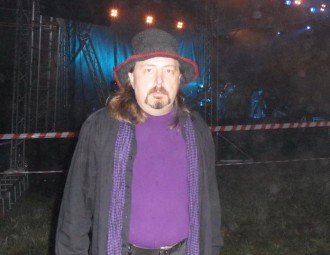Aleh Hamenka: Every village that wants to attract tourists should regularly hold its small festival

Leader of folk-band Palac Aleh Hamenka described his own theory of the three levels’ organization of ethnic festivals and named the quality required to organize such events in interview to the EuroBelarus Information Service.
Leader of folk-band “Palac”Aleh Hamenka described his own theory of the three levels’ organization of ethnic festivals and named the quality required to organize such events in interview to the EuroBelarus Information Service.
Let us recall that international ethno music festival of "Volnaje Pavetra" (“Fresh air”) was held in a farmstead of Šabli near ValoЕѕyn for the fifth time.
Aleh Hamenka noted that there prevails totally European atmosphere on such festivals, held at similar fests held in Polish or German villages. Such events take place out there almost every week, while in Belarus, unfortunately, only few times a year. According to Aleh Hamenka, there should be more such festivals in Belarus:
- The format of new ethno, folk, primarily of Belarusan one, gives the ground for inviting to us world-known ethno musicians. For instance, this year the festival "Volnaje Pavetra" was visited by performers from Germany and Ukraine.
Take Germans from band Di Grine Kuzine – they play wonderful ethno music, very rich. Unfortunately, very little of it reaches Belarus. We remember no one except, perhaps, Rammstein from Germany. We don’t even know Shantel. We learned about him when Russian singer Philip Kirkorov bought a song from him. And Shantel, a German producer and DJ, is known for his electronic remixes of traditional Balkan music and for his work with gypsy brass orchestras. He performs Balkan and Gypsy music, in such a passionate arrangement. We are short of such music in Belarus, and it would be god if the situation changes in a better way. That is why we are negotiating with the most interesting bands.
When discussing the level of existing Belarusan ethnic festivals, Aleh Hamenka said that they offer not only relaxation, but also the space for getting certain information and knowledge. These are the festivals intended for an educated listener primarily. It attracts the audience that creates the whole mood for the event.
- Generally speaking, the level of such festivals should be different as they should be very local. Every village that wants to attract tourists or to show its beauty should regularly hold such a small festival. This is the first level. The second level is regional, connected with traditional Belarusan fests. And, of course, international or republican level; at such fest one can listen to folk music of the nearest countries and, on a large scale, of the whole world. Unfortunately, such festivals there are not many. For instance, we don’t know about an amazing festival of folk art “Beraginia”, which takes place in the Aktsiabrski village near RudabelšДЌyna. Lacks also appropriate advertisement for such fests to be attended not only by motivated people, but by specialists-folklorists, as well. Festivals should be held at all the three levels, and they should be different.
Aleh Hamenka believes that in order to hold a small festival you don’t need much effort.
- You simply need to be passionary. Despite the fact that most probably such festivals won’t be commercially successful in the near future, these offer cultural space. Without such a space and the audience there will be neither new music, nor new names, and no culture development at all. Of course, passionate people have to work hard. Obsession with your project is an obligatory quality, you can’t live without it.
-
03.01
-
07.10
-
22.09
-
17.08
-
12.08
-
30.09



























